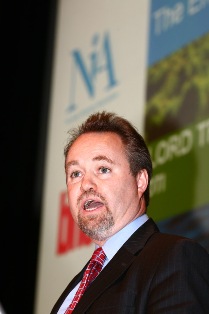 The UK government intends to "remove barriers" to new nuclear plants in the UK and "ensure nuclear is a viable option" Lord Truscott told the nuclear industry on 7 December.
The UK government intends to "remove barriers" to new nuclear plants in the UK and "ensure nuclear is a viable option" Lord Truscott told the nuclear industry on 7 December. Speaking at the Nuclear Industry Association's annual Energy Choices meeting in London, the recently appointed Undersecretary for Energy said there was "no one solution" for the UK's problems of climate change and a looming dependence on imported gas and that " Nuclear has a role to play alongside other low-carbon generation."
In order to speed investment in renewable and nuclear projects, Truscott promised new legislation would make "Fundamental reforms" to planning procedures. He said the current system was too "lengthy and inefficient" for major energy projects. In addition, the private energy market would be incentivised in some way to help low-carbon generation be more competitive.
Specific measures to simplify nuclear projects would include the definition of criteria for site suitability for new nuclear, a justification of nuclear in terms of health and safety, the pre-licensing of plant designs and a 'statement of need' for nuclear. In addition, the government plans to appoint an expert in large project planning with the remit of moving essential enery projects through.
The UK government is due to publish a White Paper on energy early next year ahead of new legislation. A three-month Energy Review was carried out this summer to determine the range of policies that might help the country beat some major energy challenges: The nuclear power plants that generate 10,664 MWe for the UK are nearing the ends of their operational lives and all but one will be shut down by 2023. At the same, about 7000 MWe of coal-fired generation will be shut down under the European Large Combustion Plants directive.
Between the two, the UK must replace about 30% of its power generation infrastructure while reserves of natural gas from the North Sea dwindle and climate change becomes a major concern.
Further information
Nuclear Industry Association
WNA's Nuclear Power in the United Kingdom information paper




_18570.jpg)
_16159.jpg)
_49205.jpg)
_18938.jpg)





